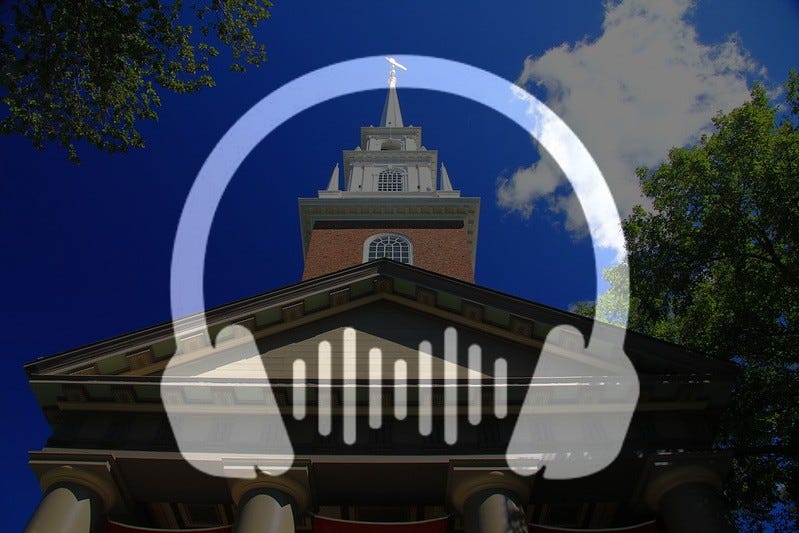When Are You Too Old to Be Front-Page-of-the-Atlantic Dumb?
This blog reaffirms its strong anti-child stance
***FYI, yesterday’s piece, in which I predicted bad takes in response the Baltimore bridge collapse, has been updated to include real examples of those takes. Because eight of the 12 takes that I parodied are now real.***
If you had put a microphone in front of me when I was 23, I definitely would have said something dumb. Though I probably wouldn’t have said something dumb enough to lead a five thousand word article in The Atlantic. Remarkably, a Stanford student achieved exactly that this week — here is the opening paragraph of an article titled “The War at Stanford”:
Social media is treating El Boudali as something of an extremist (did they miss the part where he concedes that Hamas is not perfect?). Some are suggesting that his peppy support for a murderous theocracy and his calls to kill the president are…well gauche. Interestingly, El Boudali rose to his own defense on Twitter, and — as you might expect — dug himself a million miles deeper. In addition to hating “Zionists” (wink wink wink wink wink wink wink wink wink wink wink), he also has no truck for feminists, gay people, or trans people. So, his only defenders at this point are probably: 1) Hamas, and 2) Stanford University.
But before El Boudali revealed himself to be a normie theocrat, journalist Graham Starr took to Twitter to defend the bloodthirsty li’l tike:
I think that Starr has something of a point. It probably would have been better if The Atlantic had not used El Boudali’s name (FWIW, I’m using his name because the cat is completely out of the bag). El Boudali is not a public figure, and his specific identity adds nothing to the story. Any adult making a public statement could have their actions reported, but that doesn’t mean that they should in every case. And that’s doubly true when the person is an “adult” in the same way that a Hot Pocket and a grape soda are a “feast”.
How to react to young people making horrendous statements has been a contentious topic since October 7. When I parsed the meltdown at Harvard last year, I endorsed harsher penalties (in the form of a rescinded job offer) for the mid-’20s law student who proactively sent a letter defending Hamas, and softer penalties for the late-teens student group members who passively endorsed the attack (I mean, who among us didn’t get drunk as a freshman and co-sign a bit of terrorism?). A lot happens between ages 18 and 25. And usually, one thing that happens is that you make such a galactic ass of yourself that you realize that maybe you should shut your fool mouth sometimes.
Whatever your views are on how we should treat young people who do and say bad things, those rules should be consistently applied. Some of the reactions to Starr’s defense posited that he wouldn’t have defended a young person who violated a left-wing shibboleth (and Starr does seem to be fine with “so-called cancel culture” in other cases). It’s also easy to think of times when the left has no compunction about coming down on a young person like a ton of bricks: There was a New York Times article about a 15 year-old using a racial slur, and there was the Covington Catholic debacle, and 2020 featured many stories about colleges rescinding acceptance from applicants who said offensive things. For Christ’s sake: Deadspin used a misleading photo to accuse a 9 year-old of wearing blackface. As with seemingly all campus free speech issues relating to Gaza, the problem is that parts of the left are trying to suddenly assert principles that they spent several years publicly spitting on.
A “go easy on the kids” posture also contradicts the “listen to the children” narrative that some people love. The Parkland Teens and Sunrise Movement are predicated on this narrative, which is also Greta Thunberg’s whole schtick. It seems fair to ask: Are young people preternaturally wise soothsayers sent to warn adults of our wicked ways, or are they underdeveloped naifs who can’t be held to the same standards as grown-ups? They can’t be both.
I Might Be Wrong has presented a clear and consistent answer to this question: Young people are morons. Few bloggers dedicate column inches to letting small children have it with both barrels, but I have done exactly that. The rank idiocy of young people has been an early and frequent topic of interest on this newsletter. Some people can be accused of hypocrisy on this front, but I cannot: I have made it abundantly clear that I consider young people to be dangerously stupid tenderfoots who are only marginally more sentient than pigs.
And that, I believe, fully justifies my “go easy on the kids” position. Hamza El Boudali — though clearly a museum-quality dipshit at the present time — could still possibly turn it around. It’s not inconceivable for me to imagine him turning into a chastized-and-mostly-silent 35 year-old (a few divorces and some mood stabilizing drugs might speed him along that track — just sayin’). I certainly needed the grace that people extended to me when I was young. And I stand firm in my belief that the extent that we should listen to young people starts at absolute zero and only reaches measurable numbers when a person enters their mid-20s. Because it feels like believing anything else would be unfair.










The premise here is fine. Kids are undeveloped, so go easy on them. But a 23 year old is not a kid. This is the same logic that makes us coddle undergraduates in safe spaces with trigger warnings. What's the next age of majority going to be? 28? 31?
Before I condemn an insane antisemite, I need to know just one thing: Was he wearing a MAGA hat?